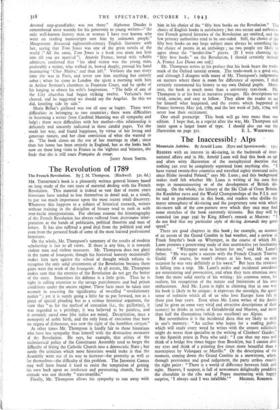The Inaccessible Alps
Mountain Jubilee. By Arnold Lunn. (Eyre and Spottiswoode. 15s.)
READERS with an interest in ski-racing, in the backwash of inter- national affairs and in Mr. Arnold Lunn will find this book an apt and often witty illustration of the metaphysical doctrine that nothing can ever be completely separated from anything else. "I have visited twenty-five countries and travelled eighty thousand miles since Hitler invaded Poland," says Mr. Lunn ; and this background makes itself felt whether Mr. Lunn is writing of his own first steps in mountaineering or of the development of British ski- racing. On the whole the history of the Ski Club of Great Britain, the Kandahar races_and the World Championships of the F.I.S. may be said to predominate in this book, and readers who dislike the matey atmosphere of ski-racing and the proprietary tone with which ski-racers talk of the cow-pasture over which they race may find some stretches of the book extremely tiresome. But they will be consoled (on page 259) by King Albert's remark at Murren: "I do not find that my particular style of ski-ing demands any great speed."
There are good chapters in this book ; for example, an account of an ascent of the Grand Combin in bad weather, and a review of Frank Smythe's book on Whymper' in the course of which Mr. Lunn presents a penetrating study of that unattractive yet fascinating character: " Whymper used to lecture for me," said Mr. Lunn's father. "He was quite a success with the French Church Touring Guild. Of course, he wasn't always at his best, and on one occasion he was very definitely at his worst." But here the reviewer is falling into a trap. Mr. Lunn's asides and incidental anecdotes are entertaining and provocative, and often they turn attention away from the more solid merits of his writing : his common sense, his realism, his recognition of the nature and limitations of his own enthusiasms. And Mr. Lunn is right in claiming that in one way his book is likely to be unique: it expresses the nostalgia, the queer sense of isolation which all of us' who love Europe have felt in these past four years. Even when Mr. Lunn writes of the Andes (and he gives us some very vivid and attractive descriptions of their scenery) he thinks in terms of Grindelwald and Murren, and more than half the illustrations (which are excellent) are Alpine.
But nevertheless it is the incidental dicta that are likely to stick in one's memory : "An author who hopes for a reading public which will study every word he writes with the utmost solicitude might do worse than specialise in the writing of Climbers' Guides," or the Spanish priest in Peru who said: "I can shut my eyes and think of a bridge five times bigger than Brooklyn, but I cannot shut my eyes and think of a painting five times more beautiful than a masterpiece by Velasquez or Murillo." Or the description of the
moment, coming down the Grand Combin in a snowstorm, when, through persistence and good Judgement, the party strikes exactly the right point : "There is a world of difference between faith and sight. Heaven, I suspect, is full of newcomers delightedly prodding the cherubim in the ribs and of Popes murmuring with happy
surprise, 'I .always said I was infallible?" MICHAEL ROBERTS.


























 Previous page
Previous page